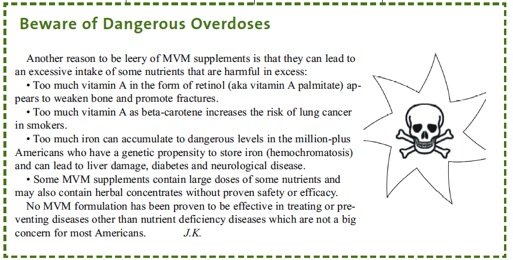Are Multivitamins Beneficial?
Americans are as confused about what a healthy diet is as ever. Surveys are showing that most Americans think they eat a healthy diet, yet over half of them take a multivitamin and mineral (MVM) supplement. The #1 reason given for taking it is because they believe they don?t always eat right. Other reasons for taking a MVM include a belief that it reduces the risk of chronic disease, and it makes people feel better, increases energy, and improves their health. Unfortunately, there is little reason to believe MVMs improve health or make people feel better. Even so, Americans spend about $23 billion a year on food supplements with more than half of them MVM supplements.
The National Institute of Health (NIH) put together an independent panel to evaluate the safety and effectiveness of taking a MVM supplement and released a preliminary report from this expert panel in May. The full report will be available by July 2006 at http://consensus.nih.gov. This state-of-the-science report notes there is not sufficient information available yet to conclude whether or not people are better off taking a MVM supplement. While the NIH panel was unsure about whether or not those taking various MVM supplements would on average be better or worse off, they did call for expanded oversight of the poorly regulated food-supplement industry.Pro Supplement ArgumentsThe best argument for taking a MVM supplement is that the typical American diet is full of refined sugars, grains, fats and oils, and alcoholic beverages, which provide lots of calories but contain few vitamins and minerals. In addition, we know that at least for some nutrients like iron, folic acid, magnesium, and vitamins D and B-12, many Americans fall short of what they need. Quite a few Americans also have marginally low intakes of calcium, zinc, selenium, and potassium that put them below recommended intake levels and may increase their risk of disease. Most MVM products will supply all these nutrients at recommended levels with the exception of potassium and calcium.Anti Supplement ArgumentsThe best argument against taking a MVM supplement is that it is no substitute for a nutritionally balanced diet.Unlike a MVM, a healthier diet has been proven to cut the risk of many diseases. Indeed, taking a MVM supplement might give some people the false impression that supplements rather than diet is the key to preventing CVD, cancer, diabetes, and numerous other diseases. These ills are caused in large part by all the nutrient-poor refined foods and fatty animal products people eat.You cannot lower your cholesterol level or your blood pressure with a MVM supplement nor is there any credible research a MVM supplement will meaningfully cut your risk of cancer and other serious diseases. If Americans were dying from scurvy, anemia, pellagra, beriberi, and other nutrient deficiency diseases, then a MVM supplement would be the answer.Unfortunately, most Americans die from diseases caused largely by too much salt, hydrogenated fat, saturated fat, cholesterol, alcohol, and too many calories and not enough fiber. Most of the foods rich in these substances are also the same foods lacking in vitamins and minerals. Obviously a MVM supplement can do little or nothing but give people a false sense of confidence when it comes to avoiding CVD, cancer, obesity, diabetes, senility, osteoporosis, etc.


Bottom Line:Americans should be told that a MVM supplement is no substitute for a healthy diet; and if they eat a healthy diet, they probably won?t benefit from a MVM and most other supplements. Many people taking MVM supplements should be careful that the supplements are not contributing to excessive intakes of vitamin A or iron. People should avoid MVM supplements containing herbs and/or more than 100% of recommended intake levels.By James J. Kenney, PhD, RD, FACN.


